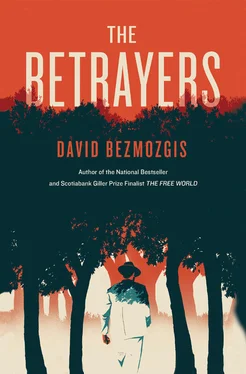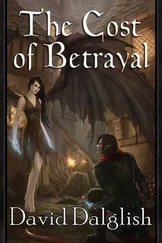That was the end of their conversation. Amnon walked off with his garbage and the next morning it was plastered on the front page of every newspaper in Israel.
Small round halogen lights had been set into the flagstones of the promenade, evidently part of some recent beautification project. From Lenin Square, the lights formed an illuminated path that extended about a kilometer, as far as the Hotel Oreanda. After a dinner at a restaurant that overlooked the square and the harbor, Kotler and Leora followed the path, leisurely now, feeling, for the first time since the news had broken, not like two culprits harried and pursued. The day’s heat had subsided, and the nighttime air felt gentle, consoling, as if bestowed upon them by a sympathetic spirit. The day’s throngs had also thinned, and most of the people on the promenade proceeded as they did, without urgency, seemingly without destination. At a certain point, a column of shops and nightclubs split the promenade into two branches. The lower branch bordered the sea; the upper branch ran between two rows of storefronts. For no particular reason, Kotler and Leora followed the upper branch and saw themselves reflected in the darkened storefronts on either side. Out in the open, with their images duplicated again and again, it was as though they had unwittingly made a bold statement of exhibitionism. Not only could they now be seen but, in this hall of mirrors, they could not be missed.
They walked for some time without speaking. With their arms linked, they gave the impression of a couple complete unto themselves, unburdened by the sorts of complications that could lead a person with a constitution weaker than Kotler’s — weaker than Leora’s, he believed — to commit some desperate, rash, irredeemable act. In the matter of taking one’s self in hand, Kotler had world-class credentials. He had mastered his emotions in circumstances far more dire than these. To prove the point to himself, he summoned up an anodyne image from childhood, from this very place, fifty-three summers ago.
— Did I tell you my father was something of a sportsman? Kotler said to Leora.
She shook her head.
— In Lvov, as a boy, before the Soviets took over, he played soccer and ran track and field for the Maccabi sports club. He claimed to have been their best sprinter.
— That’s something else you never told me. Your father was Zionist?
— He didn’t tell me himself until I informed him that I wanted to immigrate to Israel. I knew growing up that he took a dim view of the Soviet Union, but only in the way most children knew such things about their parents. He’d make a veiled remark. He’d listen covertly to the BBC. But not until I announced myself did he reveal that he had once been the fleetest little Zionist in Lvov!
— No, you never told me, Leora said.
By the time Kotler was a boy, his father was no longer in shape to run. At the front he’d been wounded in the knee, and the wound had never properly healed. Nevertheless, he retained his love for sport and tried to cultivate this interest in Kotler. Physically, they looked very much alike — there were a few childhood photos of his father preserved from before the war, and Kotler could see that the resemblance between him and his father was striking. Even now, when Kotler looked in the mirror, he saw his father’s face. Increasingly, he sought his father’s face — but that was another story. Yet somehow, in spite of this resemblance, Kotler had failed to inherit his father’s knack for running. His father did not easily accept this. When Kotler was little, his father tried to train him. They’d be walking on the street and he’d point to a tree or a lamppost fifty meters away and tell Kotler to run to it. They’d do the whole thing very formally. Kotler would get down into a crouch and his father would keep time on his wristwatch. Borya: Ready, steady, go!
Kotler saw a version of this scene before his eyes. The length of pavement near the building they had inhabited in Lvov. He remembered his father calling the commands, and he also remembered hearing neighbors taunt him with the mocking couplet Zhid, zhid, na verevochki bezhid. Kike, kike, running on a string. And here in Yalta, perhaps on this very stretch, in the late evening, they had repeated the exercise. Solomon, stop torturing the boy! his mother had admonished his father, who had dismissed her with a wave of his hand. Meanwhile, little Borinka knelt down and looked over his shoulder to see his father peering intently at his watch face, the device pinched between the thumb and index finger of his right hand. Kotler knew he wasn’t fast, but he wanted to please his father. And, on some level, his childish heart never quite relinquished the hope that, miraculously, the next time, his legs would unleash their latent power and whirl beneath him like a blur.
Kotler released Leora’s arm and handed her his hat.
— Time me, he said with an impish smile. From here to that post.
Leora arched an eyebrow, but Kotler was already bending down to assume a semblance of the sprinter’s crouch, or as much of one as the constraints of age and inactivity allowed.
— Whom should I call if you have a heart attack?
— An ambulance, Kotler said.
Kotler looked up at her. From here to the post, he said. Ready, steady, go.
Leora shook her head with mild exasperation but turned her wrist and held her watch face between her thumb and index finger, just as his father had.
A few people gazed with benign amusement at the spectacle of the little potbellied Jew chugging along the promenade, knees and elbows pumping. Kotler clapped his palm on the post when he reached it, making a satisfying, declarative noise. Then he trotted back to Leora like a spaniel, beaming with self-satisfaction.
— So, how did I do? Kotler asked.
— A new world record, Leora said. She reached over and gently wiped the perspiration from his brow. How do you feel? she asked.
— Like a boy.
— You are a boy, Baruch. People say you took up with a younger woman, but the truth is that I took up with a boy, Leora said affectionately.
— That’s because with you I can be a boy.
On Karl Marx Street they saw a collection of cars waiting, marked taxis on one side and unmarked sedans on the other. The drivers of the unmarked sedans — bored, surly-looking men — leaned against their vehicles. Across the way, the cabbies congregated in a group, smoking and bantering. One of them, a short stocky man with a baseball cap and a yellow reflective vest — the kind worn by crossing guards or construction workers — spoke occasionally into a walkie-talkie and barked orders at arriving drivers.
Because they were already on that side of the street, Kotler and Leora approached the driver of one of the sedans, whose car was at the head of the line. Grim-featured, with a thick black mustache, he looked to be from the Caucasus. As they neared, he eyed them as if he suspected they were out to do him ill.
— You’re for hire? Kotler asked genially.
— I am. Where to?
Kotler named the street.
— One hundred hryvnia, the man replied bluntly.
The sum amounted to a little over ten dollars, hardly a fortune, well within their means, but, Kotler felt, inflated nonetheless. He was long in the habit of not letting himself be arbitrarily bettered. In this regard, a man was well advised to be scrupulous. Slacken here or there, let this or that trifle pass, and it set a bad precedent, eroded the substrate of one’s character.
— It’s a little high, Kotler said.
— If you don’t like it, the driver replied, you can go across the street. Ride in one of theirs. But I bought this car. It belongs to me. A Nissan Maxima. I paid for it with my own money. I take care of it. I answer for it. What do you expect me to accept in return, crumbs?
Читать дальше












